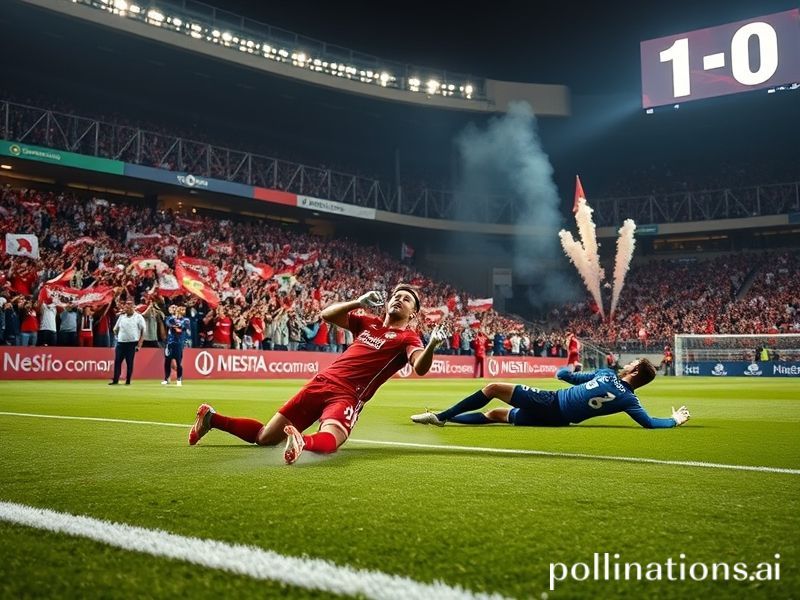Toluca vs Monterrey: Mexico’s Provincial Grudge Match as Global Parody of Human Tribalism
Toluca vs Monterrey: A Tale of Two Cities and One Unimpressed Planet
By Our Correspondent Who Has Watched Civilizations Rise and Fall Between Airport Lounges
TOLUCA, Estado de México – Somewhere beneath the volcanic smog that gives this high-altitude basin its romantic “ asthma at 2,600 meters” vibe, the latest skirmish in Mexico’s eternal Toluca–Monterrey rivalry sputtered to life last weekend. On paper it was only Liga MX football: Deportivo Toluca F.C. hosting C.F. Monterrey, two clubs whose budgets together could refinance a medium-sized Balkan republic. In practice it was yet another proxy war for Latin America’s favourite blood sport: deciding which provincial elite gets to feel cosmically validated for the next 48 hours.
The final score (2-1 to Toluca, for the gamblers keeping score in crypto) matters less than what the fixture keeps telling us about the human need to organise ourselves into mutually loathing tribes. From Ukraine to Uganda, humanity is currently perfecting new ways to slaughter over postcodes and 19th-century border doodles; Mexico, refreshingly, limits itself to choreographed chants and the occasional overhead flare that lands in the disabled section. Progress, of a sort.
Global significance? Start with geography. Toluca, a factory town that pretends it’s a capital, sits closer to Mexico City than most commuters sit to their own conscience. Monterrey, a furnace with banks, squats 700 kilometres northward within binocular distance of Texas—close enough to inhale U.S. interest rates and far enough from Mexico City to nurture the persistent fantasy of secession. One city exports car parts; the other exports CEOs and insecurity about being called “regio” hicks. Together they form the bipolar spine of Mexican capitalism, a sort of Schizophrenic Switzerland with better tacos and worse credit ratings.
Internationally, the match functioned as a Rorschach test for whatever crisis you happen to be escaping. European viewers saw a continent that once bankrolled entire empires now reduced to scouting wonder-kids who will be flipping NFTs by 26. Asian streaming audiences witnessed another data point proving that if you pump enough money into anything—grass, gambling, or geopolitics—you can sell it back to yourself as content. North American investors simply checked whether any of the goal scorers had a U.S. passport (alas, no green-card bump this quarter).
Meanwhile, the real action unfolded in the comments sections, that digital Colosseum where nuance goes to die. Toluca fans uploaded memes of Monterrey’s aluminium magnates crying into piles of dollars; regio trolls countered with satellite images of Toluca’s grey skyline captioned “Gotham, but without the charm.” Both factions, naturally, uploaded their tirades via American-owned platforms, on Chinese-made phones, while wearing kits manufactured in Bangladeshi sweatshops. If irony were a criminal charge, we’d all be doing consecutive life sentences.
Back on the pitch, the home supporters celebrated by singing “¿Dónde están los regios?”—a rhetorical question akin to asking why billionaires buy yachts when they could buy therapy. The answer, everywhere and nowhere, is that modern identity needs an adversary the way a Ponzi scheme needs fresh cash. Strip away the jerseys and you’re left with two sets of taxpayers arguing over whose potholes are more photogenic.
Yet the ritual persists because the alternative—acknowledging that neither altitude nor ambition immunises you from the planetary slide toward heat death—is unbearable. While the final whistle blew, wildfires incinerated Canadian forests, Greek islands practised their annual evacuation drills, and somewhere off the coast of Yemen a forgotten oil tanker threatened to dump four times the Exxon Valdez cargo into the Red Sea. But sure, chant louder; the cosmos is taking notes for its end-of-season blooper reel.
In the mixed-zone flash interview, Toluca’s Colombian striker thanked God, his agent, and “la gente linda del Estado de México,” demonstrating that cliché remains the only sustainable resource we have left. Asked about continental glory, he flashed the smile of a man who knows that tomorrow’s tabloids are already wrapping tomorrow’s street tacos. Glory, like the ozone layer, is thinning but still good for one more headline.
So the rivalry will roll on, refreshed weekly like a subscription service you forgot to cancel. Someday the volcanoes around Toluca will wake up and Monterrey’s aquifers will finally file for bankruptcy. Until then, the planet spins, the markets fluctuate, and two cities keep arguing over a leather sphere—proof that Homo sapiens, for all its art and atrocity, still prefers the small, manageable apocalypse of defeat to the large, unmanageable one of perspective.







